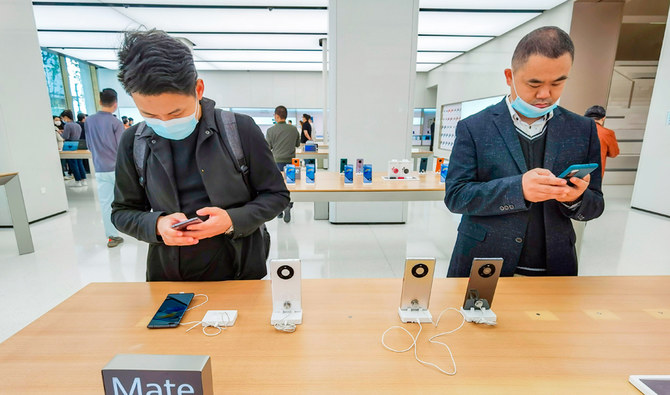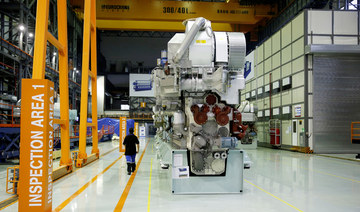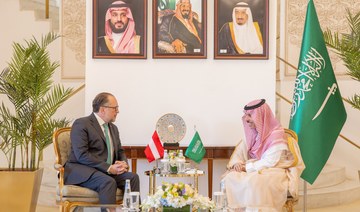SHANGHAI: Huawei Technologies eked out a gain in third-quarter revenue as the impact of the COVID-19 pandemic added to supply-chain difficulties brought about by US restrictions on doing business with the Chinese firm.
The figure comes a day after the telecommunications equipment maker announced its latest flagship smartphone, potentially its last in the high-end Android segment most dependent on US technology.
It also comes after Sweden became the latest nation to ban Huawei from its fifth-generation (5G) network infrastructure, following US suspicion of Huawei’s relationship with China’s communist government — which Huawei has dismissed.
Hinting at an end to at least four years of double-digit growth, revenue grew 9.9 percent in January-September versus the same period a year earlier to 671.3 billion yuan ($100.4 billion), the private company said in a statement on Friday without providing a segment breakdown.
Revenue for the third quarter alone rose 3.7 percent on year to 217.3 billion yuan, Reuters’ calculations showed.
Net profit margin for the nine months was 8 percent, versus 8.7 percent over the same period a year earlier, Huawei said.
FASTFACT
Huawei revenue grew 9.9 percent in January-September versus the same period a year earlier to 671.3 billion yuan ($100.4 billion).
The US effectively cut off Huawei’s access to US software and chip-making equipment in the spring, following similar measures in May 2019 that are gradually taking effect.
Huawei’s line of Kirin chips, designed in-house, helped catapult the firm to the top of the global handset market.
Earlier this year, however, Consumer Business Group Chief Executive Richard Yu said US restrictions meant Huawei would soon stop making high-end Kirin chips. Analysts expect its stockpile of the chips to run out next year.
On Thursday, in a livestream Yu unveiled Huawei’s latest flagship smartphone series, the Mate 40.
The device, priced at 4,499 yuan for the feature-light version, comes equipped with the Kirin 9000 chipset, manufactured at the 5nm process node that only Apple and Qualcomm have been able to bring to market at scale. The Mate 40, however, could be the company’s last device of its kind. Already, consumers in China have rushed to buy Huawei smartphones on concerns over the availability of newer models.
Meanwhile, overseas sales have been sluggish due in part to US restrictions blocking Huawei’s access to Alphabet’s Google Mobile Services.
Mo Jia, who tracks the global smartphone sector at researcher Canalys, said the Mate 40 will likely sell well in China, though total sales will suffer from supply-chain issues.
“Huawei won’t find it hard to sell the Mate 40 series, as most of the shipment will go to China,” Jia said. “But it can only produce limited units powered by the Kirin 9000 series, which will impact the number of the Mate 40 phones it can ship.”
Reflecting its manufacturing difficulties, Reuters reported last week that Huawei was talking to Digital China Group and others to sell parts of its Honor budget handset business in a deal that could fetch up to 25 billion yuan.
Premium rival Apple began selling two of its latest flagship iPhones in stores worldwide on Friday, with analysts expecting the US firm to take market share from Huawei as the pair dominate the high-end handset segment in China.
























